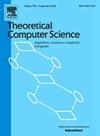The distributed algorithms for the lower-bounded k-center clustering in metric space
IF 0.9
4区 计算机科学
Q3 COMPUTER SCIENCE, THEORY & METHODS
引用次数: 0
Abstract
Clustering is a fundamental unsupervised machine learning problem. However, due to limited processing memory and CPU power, it is challenging to cluster large-scale data. The distributed methods have received great attention in recent years since large-scale data can be stored and computed on multiple machines. In this paper, we study a variant of the k-center clustering problem, i.e., the lower-bounded k-center clustering problem (denoted as the Lb-k-Cen problem), in the Massively Parallel Computation (MPC) distributed model. The current best distributed result for the Lb-k-Cen problem has several rounds of communication between the coordinator and machines, which may increase the local computation and communication cost of the algorithm for handling large-scale data. To achieve fewer local computation and communication rounds, we use the threshold method and flow network technique, which avoid local computation again in each machine, and can achieve a two rounds -approximation algorithm in metric space. Moreover, we also consider the distributed algorithm for the Lb-k-Cen problem in the metric space with bounded doubling dimension, and propose a two rounds -approximation algorithm.
求助全文
约1分钟内获得全文
求助全文
来源期刊

Theoretical Computer Science
工程技术-计算机:理论方法
CiteScore
2.60
自引率
18.20%
发文量
471
审稿时长
12.6 months
期刊介绍:
Theoretical Computer Science is mathematical and abstract in spirit, but it derives its motivation from practical and everyday computation. Its aim is to understand the nature of computation and, as a consequence of this understanding, provide more efficient methodologies. All papers introducing or studying mathematical, logic and formal concepts and methods are welcome, provided that their motivation is clearly drawn from the field of computing.
 求助内容:
求助内容: 应助结果提醒方式:
应助结果提醒方式:


